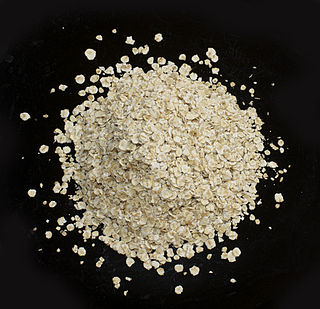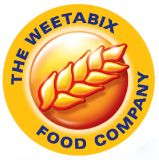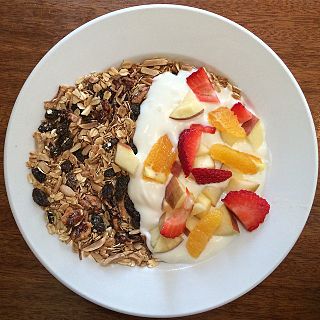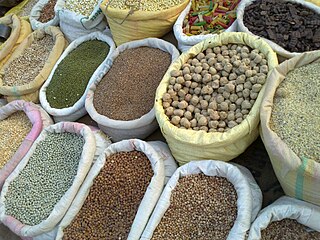
A cereal is a grass cultivated for its edible grain. Cereals are the world's largest crops, and are therefore staple foods. They include rice, wheat, rye, oats, barley, millet, and maize. Edible grains from other plant families, such as buckwheat and quinoa, are pseudocereals. Most cereals are annuals, producing one crop from each planting, though rice is sometimes grown as a perennial. Winter varieties are hardy enough to be planted in the autumn, becoming dormant in the winter, and harvested in spring or early summer; spring varieties are planted in spring and harvested in late summer. The term cereal is derived from the name of the Roman goddess of grain crops and fertility, Ceres.

The oat, sometimes called the common oat, is a species of cereal grain grown for its seed, which is known by the same name. Oats appear to have been domesticated as a secondary crop, as their seeds resembled those of other cereals closely enough for them to be included by early cultivators. Oats tolerate cold winters less well than cereals such as wheat, barley, and rye, but need less summer heat and more rain, making them important in areas such as Northwest Europe that have cool wet summers. They can tolerate low-nutrient and acid soils. Oats grow thickly and vigorously, allowing them to outcompete many weeds, and compared to other cereals are relatively free from diseases.

Porridge is a food made by heating or boiling ground, crushed or chopped starchy plants, typically grain, in milk or water. It is often cooked or served with added flavourings such as sugar, honey, fruit, or syrup to make a sweet cereal, or it can be mixed with spices, meat, or vegetables to make a savoury dish. It is usually served hot in a bowl, depending on its consistency. Oat porridge, or oatmeal, is one of the most common types of porridge. Gruel is a thinner version of porridge and congee is a savoury variation of porridge of Asian origin.

Breakfast cereal is a category of food, including food products, made from processed cereal grains that are eaten as part of breakfast, or as a snack food, primarily in Western societies.

Oatmeal is a preparation of oats that have been de-husked, steamed, and flattened, or a coarse flour of hulled oat grains (groats) that have either been milled (ground), rolled, or steel-cut. Ground oats are also called white oats. Steel-cut oats are known as coarse oatmeal, Irish oatmeal, or pinhead oats. Rolled oats were traditionally thick old-fashioned oats, but they can be made thinner or smaller and may be categorized as quick oatmeal or instant oatmeal depending on the cooking time required, which is determined by the size of the oats and the amount of precooking.

Weetabix Limited, trading as Weetabix Food Company, is a food processing company that is responsible for the production of breakfast cereal brands, including Weetabix, Alpen, Crunchy Bran and Ready Brek. The company also produces Puffins cereal and Snackimals snacks through their Barbara's Bakery division.

Granola is a food consisting of rolled oats, nuts, seeds, honey or other sweeteners such as brown sugar, and sometimes puffed rice, that is usually baked until crisp, toasted and golden brown. The mixture is stirred while baking to avoid burning and to maintain a loose breakfast cereal consistency. Dried fruit, such as raisins and dates, and confections such as chocolate are sometimes added. Granola is often eaten in combination with yogurt, honey, fresh fruit, milk or other forms of cereal. It also serves as a topping for various pastries, desserts or ice cream. Muesli is similar to granola, except that it is traditionally neither sweetened nor baked.

Cheerios is a brand of cereal manufactured by General Mills in the United States and Canada, consisting of pulverized oats in the shape of a solid torus. In some countries, including the United Kingdom, Cheerios is marketed by Cereal Partners under the Nestlé brand; in Australia and New Zealand, Cheerios is sold as an Uncle Tobys product. It was first manufactured in 1941 as CheeriOats.
Post Consumer Brands, LLC is an American consumer packaged goods food manufacturer headquartered in Lakeville, Minnesota.

Product 19 was a breakfast cereal made by Kellogg's. Introduced in 1967, it consisted of lightly sweetened flakes made of corn, oats, wheat, and rice, marketed as containing all required daily vitamins and iron. The product was discontinued in 2016.

Groats are the hulled kernels of various cereal grains, such as oats, wheat, rye, and barley. Groats are whole grains that include the cereal germ and fiber-rich bran portion of the grain, as well as the endosperm.

Uncle Tobys is an Australian food manufacturing company which specialises in breakfast oat products. Since its foundation in 1861, the company has expanded its product range across the cereal and ready-to-eat snack market. Uncle Tobys is currently operated as a wholly owned subsidiary of Nestlé, after being acquired in 2006. Uncle Tobys’ main factory is situated in the town of Wahgunyah, Victoria.

MOM Brands Company is an American producer of breakfast cereals, headquartered in Northfield, Minnesota. It markets its products in at least 70% of the country's grocery stores, with estimated sales in 2012 of US$750 million. It operates four manufacturing plants, in Northfield, Minnesota; Tremonton, Utah; Asheboro, North Carolina; and St. Ansgar, Iowa. The company has distribution centers in Grove City, Ohio; Coppell, Texas; and Salt Lake City, Utah.

Kilmacthomas or Kilmactomas, often referred to locally as "Kilmac", is a town on the River Mahon in County Waterford, Ireland. It lies on the R677, a road north of the N25 national primary road from Dungarvan to Waterford.

River Mahon flows from the Comeragh Mountains in County Waterford, Ireland.

Quaker Instant Oatmeal is a type of oatmeal made by the Quaker Oats Company, first launched in 1966. It is crafted from whole grain oats.

A grain is a small, hard, dry fruit (caryopsis) – with or without an attached hull layer – harvested for human or animal consumption. A grain crop is a grain-producing plant. The two main types of commercial grain crops are cereals and legumes.

The Quaker Oats Company, known as Quaker, is an American food conglomerate based in Chicago, Illinois. As Quaker Mill Company, the company was founded in 1877 in Ravenna, Ohio. In 1881, Henry Crowell bought the company and launched a national advertising campaign for Quaker Oats.

A staple food, food staple, or simply staple, is a food that is eaten often and in such quantities that it constitutes a dominant portion of a standard diet for an individual or a population group, supplying a large fraction of energy needs and generally forming a significant proportion of the intake of other nutrients as well. For humans, a staple food of a specific society may be eaten as often as every day or every meal, and most people live on a diet based on just a small variety of food staples. Specific staples vary from place to place, but typically are inexpensive or readily available foods that supply one or more of the macronutrients and micronutrients needed for survival and health: carbohydrates, proteins, fats, minerals, and vitamins. Typical examples include grains, seeds, nuts and root vegetables. Among them, cereals, legumes and tubers account for about 90% of the world's food calorie intake.


















